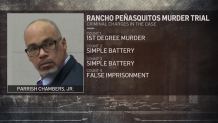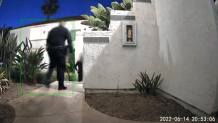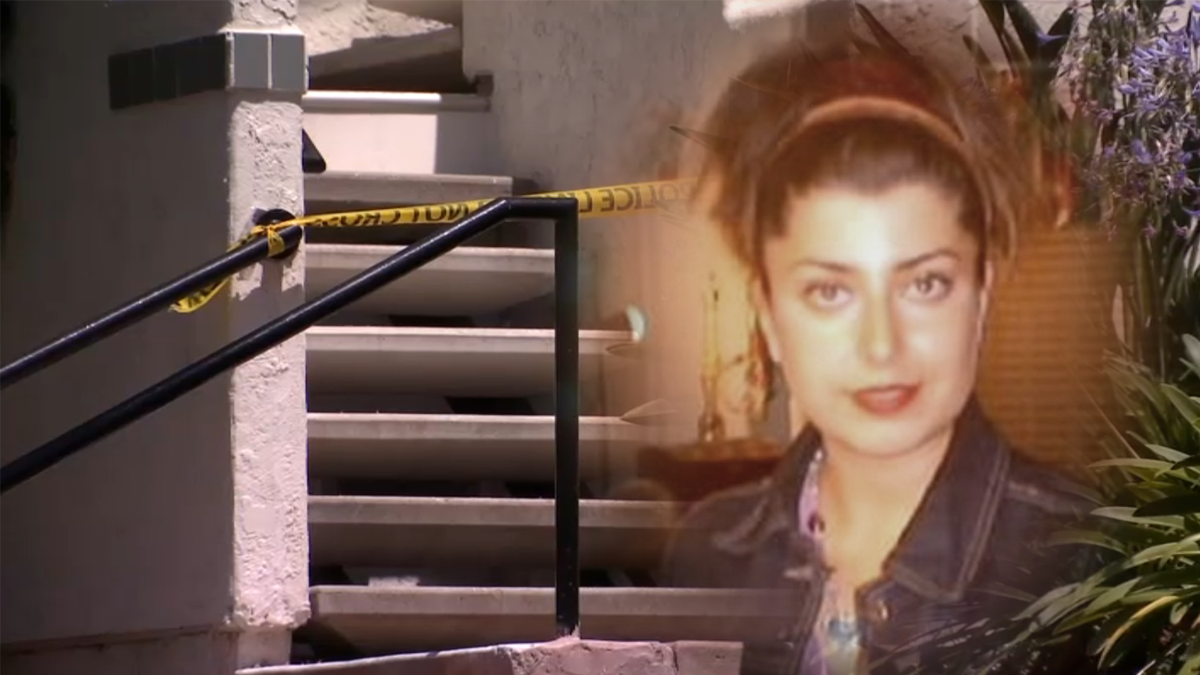The fate of Parrish Chambers Jr. is now a jury’s decision to make. Chambers is accused of smashing his way into Connie Dadkhah’s condo in June of 2022 and beating her to death. He’s pleaded not guilty.
It’s a case that grabbed national headlines over the emergency response of the San Diego Police Department. It took officers about 45 minutes to arrive after neighbors called 911 to report the break-in. Once they arrived, they left about 15 minutes later when they weren’t able to make contact with Dadkhah. They told NBC 7 Investigates they didn’t force entry because they had reason to believe the defendant lived there.
The prosecution and defense have different narratives about what happened that night. While both sides don’t disagree that Chambers broke through a second-story balcony sliding glass door to assault Dadkhah, the defense says she survived the attack. Public defender Abe Genser says the pair reconciled afterward, had sex and did drugs. He says it was methamphetamine that caused a stroke that killed Dadkhah, and not the multiple skull fractures from being beaten to death as the medical examiner’s report states.
During previous days of the trial, Genser brought out a group of expert witnesses for another assertion: Chambers was blackout drunk, and, therefore, wasn’t able to make the decision to kill Dadkhah.
Before the jury got the case, both sides had a final opportunity to persuade them during closing arguments. A key point for the prosecution and deputy district attorney Trisha Amador is inconsistencies with the story Chambers told police and the fact that he admitted he lied to detectives.

“Connie is not here to tell you what happened because he killed her,” Amador said. “Her body the way it was found in the apartment on the morning of June 15th after the defendant killed her does not lie to you. Her body again on that couch does not lie to you. The glass that's all over that floor it is in the residence busted from the outside in … does not lie to you.”
Amador also took aim at the defense’s multiple theories about what killed Dadkhah.
“They implied maybe it was a stroke. Maybe it was meth. Lots of maybes, ladies and gentlemen, but zero evidence to support those maybes,” Amador said. “He acted with malice, with forethought. He acted with intent. He said what he was going to do, and he murdered a human being. I asked you to return a guilty verdict for first-degree murder.”
When it was the defense’s turn, Genser continued his efforts to inject doubt into the minds of the jury. He highlighted a lack of Dadkhah's blood at the scene, suggesting it’s evidence she survived the attack and cleaned herself up afterward.
“The prosecution has to prove to you that the story that they’re selling is the only possible story,” Genser said.

Genser also repeatedly admitted that Chambers was responsible for domestic violence against Dadkhah but reminded the jury that they needed to stick to the evidence.
“I can hear in the prosecution’s voice that there could be a desire for revenge, for retribution,” Genser said. “Revenge and retribution have no place in a courtroom. That is not why we’re here. You are not here to seek revenge. You’re to decide what happened and follow the law … I am asking you to do the right thing. Find him not guilty of 1st-degree murder. Find him not guilty of 2nd-degree. Find him guilty of involuntary manslaughter. That is what happened, and that is what you should do.”
Multiple options for the jury

In addition to the murder charge, prosecutors also charged Chambers with three other crimes where they say Dadkhah was his victim. That includes two counts of battery and one count of false imprisonment. He’s pleaded not guilty to those counts as well.
For the 1st-degree murder charge, jurors can alternatively find him guilty of 2nd-degree murder or involuntary manslaughter. And they can decide if he’s guilty of a misdemeanor instead of a felony on the false imprisonment charge. Or conversely, they can find him not guilty of any of the charges.
Prosecution plays video of defendant’s police interview

Earlier in the day, the prosecution called a rebuttal witness to introduce new evidence in the case. San Diego police homicide detective Christopher Notterman was one of two detectives who talked to Chambers on June 15, 2022.
Prosecutors played more than an hour of the interrogation video for jurors. Some sections were removed, including ones that were deemed to be irrelevant or inadmissible. Over the course of the view, Chambers repeatedly denied killing Dadkhah or even knowing what caused her injuries.
“This was my girl!” Chambers said. “I didn’t put her in this state of existence. I didn’t kill my girl, man! I didn’t kill my girl.”
At one point, detectives left the room, and Chambers can be heard talking to himself.
“Damn, Connie what the [expletive] happened?” Chambers said. ‘“What the [expletive] happened Connie?”
Chambers repeatedly doesn’t answer questions about injuries on his body, including gashes on his hand and scrapes to his face. Injuries police say came from smashing the glass door.
There have also been some inconsistencies between what Chambers testified to on the stand versus what he said during the 2022 police interrogation. That includes Chambers telling police he wasn’t drunk the night before he was arrested.
“What about last night?” a detective asked. “Did you blackout? Do you have any medical issues? Did you drink too much that you just don’t remember?"
“I didn’t blackout or nothing like that,” Chambers answered.
Chambers told police he went to Dadkhah's condo in the evening and remembered having sex with her and awoke the next morning feeling her cold body next to his on the couch. He said he never heard the police knocking on the door that night or using a loudspeaker when they tried to make contact with Dadkhah.
Scrutiny over emergency response from San Diego police

On the morning of June 15, 2022, prosecutors say Chambers emerged from Dadkhah's condo, spattered with her blood. They say he flagged down a neighbor to call 911 to report that she was dead inside. He was taken into custody soon after and charged with her murder. He’s pleaded not guilty.
Police dispatch records show around 7 p.m. the night before, Dadkhah's neighbors began calling 911. They begged police to get there quickly, reporting that a belligerent man was trying to break into a woman’s condo. Initially, the call wasn’t prioritized. About an hour later, callers had new information to tell dispatchers: the man had scaled a wall to her second-floor balcony and smashed his way inside through a sliding glass door. While police upgraded the call to a higher priority, it took another 45 minutes for officers to arrive at the complex.
Those same dispatch records, along with court filings from prosecutors, reveal officers tried to make contact with Dadkhah by calling her phone, knocking on her door and using a loudspeaker. But officers left the scene 15 minutes later after failing to make contact with anyone inside. There’s no record of Dadkhah calling the police that night.
Previous coverage:
In defending their decision not to force entry the night before, police told NBC 7 Investigates they had reason to believe that Chambers lived there. That was based on a dispatch record accessed by responding officers. Police also told NBC 7 the decision to force entry into anyone’s home shouldn’t be taken lightly and is among the highest level of legal standards they operate under.
But Chambers didn’t live there, though NBC 7's investigation revealed a history between the two. Court filings show that included an incident in 2020 where Chambers was convicted of vandalism. The judge ordered Chambers to stay away from Dadkhah. That order was still in effect when Dadkhah died.
Click here to read up on what happened during the other days of the murder trial. You can also watch replays of each day's proceedings the weekday after they happen, starting at 11:30 a.m.



